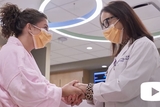Questions to ask when choosing a fetal treatment center
Learning that your unborn baby has a life-threatening condition or serious disease is a scary and overwhelming experience.
With recent advances in fetal medicine, we now know that certain birth defects can be treated before birth. These treatment options offer hope for better outcomes for babies who otherwise may not survive, or who would be born with serious, lifelong health issues.
If you and your baby are candidates for fetal surgery, choosing how to move forward is a major medical decision that can cause stress and uncertainty. And if you opt to proceed with fetal surgery, choosing where to go for care is another important decision. Operating on a tiny baby still in the womb is an extremely delicate procedure that requires the most expert and carefully coordinated care.
Knowing what questions to ask when trying to decide if fetal surgery is the right option for you and your baby is very important. This knowledge will help you weigh your options and make an informed decision that is right for you and your family.
Below are questions you should be sure to ask before you allow a clinical program to perform fetal surgery. If you don’t receive the information you need to feel comfortable, keep pushing for answers until you feel prepared to make decisions about what is best for you, your baby and your family.

Why Choose Us
At the Wood Center for Fetal Diagnosis and Treatment, you and your baby are in the hands of one of the most experienced fetal programs in the world.
What is the program’s experience (their volumes and outcomes) in performing fetal surgery?
The number of procedures a program performs (its volumes) and how well its patients do after surgery (a program’s outcomes data) can tell you how much experience a team has in caring for babies with complex conditions. You can also ask:
- How many years has the program been performing fetal surgery?
- How many patients does the program see annually?
- How many children has it treated with the same condition as your baby, and how many survive?
- How many times has the team (or surgeon) performed the recommended procedure?
- Have the program’s outcomes been extensively published in the peer-reviewed medical literature?
Who are the team members who will be performing the recommended procedure? Who else is part of the care team?
You should find out who specializes in caring for children with your baby’s condition and ask for details about the credentials, certifications and experience of the entire team. You should also make sure the program has dedicated:
- Fetal surgeons
- Maternal-fetal medicine specialists
- Neurosurgeons
- Maternal and fetal anesthesiologists
- Fetal cardiologists
- Neonatologists
- Fetal imaging radiologists
- Advanced practice, operating room, labor and delivery, and neonatal surgery nurses
- Genetic counselors
- Social workers
- Psychologists
This information can help you get a sense of the full range of support you, your baby and your entire family will have, and ensure you receive the best possible care.
Does the center offer advanced fetal diagnostic testing?
Confirming and understanding your diagnosis and any related anomalies is the most important first step in deciding what course of treatment is best for you and your baby. Many complex birth defects are misdiagnosed at first.
- Does the team include fetal imaging specialists with experience in analyzing imaging studies and diagnosing babies with suspected birth defects?
- Do they use the latest and safest imaging technologies (ultrafast fetal MRI, high resolution 3-D and 4-D ultrasounds, and sophisticated fetal echocardiography)?
Does the team have specific fetal surgery expertise?
Fetal surgery requires the most expert and carefully coordinated care from the time of diagnosis, for the surgery itself, and through the baby’s delivery and postnatal care. With more and more centers offering fetal surgery, ask these questions to confirm a program’s experience and quality of care:
- Does the center follow the agreed-upon guidelines for determining candidates who are eligible to undergo open fetal surgery or fetoscopic (minimally invasive) procedures?
- How many open fetal surgeries and fetoscopies has the team performed?
- What other types of fetal intervention does the team perform?
- If your baby has spina bifida, has the center a participant in the Management of Myelomeningocele Study (MOMS)? (MOMS was an important clinical trial that established the effectiveness of prenatal spina bifida surgery.)
What services does the hospital offer in addition to fetal surgery?
Babies with prenatally diagnosed birth defects benefit significantly from having many medical services available in a single location. Be sure to find out:
- If the pediatric hospital in which the fetal surgery will be performed is ranked among the very best children’s hospitals in the world.
- Whether the program has a dedicated neonatal surgical team that specializes in performing surgery on babies immediately after birth and provides comprehensive multidisciplinary care in the crucial postoperative time period.
- Whether the hospital has a dedicated birth unit for babies with known birth defects. The unit should be staffed and fully equipped to manage the delicate delivery required after fetal surgery and be able to deliver babies with life-threatening birth defects that need immediate treatment or surgery immediately after birth. It should be easy for the mother and family to be with the baby 24/7.
- If the newborn intensive care unit has experience caring for babies born after fetal surgery or with known birth defects.

Tour The SDU
Learn what to expect when you deliver a baby at CHOP's Garbose Family Special Delivery Unit.
Does the program offer support services, like social work and counseling?
From psychosocial support services to help with lodging, travel and insurance questions, having the right support can make a huge difference in your experience with a hospital. These services can also ensure a smoother transition from hospital to home. You can ask if the program offers:
- Family support services to help with the emotional and psychological aspects of the experience and whether these services are available to the whole family (mom, dad and siblings). For example, are there support groups for pregnant moms being treated by the program?
- Resources to help families deal with travel arrangements, lodging, relocation and other logistical concerns if you have to travel from far away or stay for an extended period.
- Support in communicating with insurance companies. Large centers have experience working directly with insurance providers, and will work with you on a case by case basis to advocate for you and your baby, providing letters of medical necessity, making phone calls, and more.
- Direct communication with your other physicians to coordinate care.
Does the hospital have comprehensive follow-up programs that continue to provide care for patients as they grow?
Depending on your child’s specific condition, ask about specialized programs dedicated to that particular condition. For example, does the hospital have an established multidisciplinary Spina Bifida Program with a long-standing stellar track record for caring for children with spina bifida?
What are the research efforts within the program?
Active research efforts show that a program is committed to advancing treatment options and improving outcomes. In particular, funding of the program’s research by the National Institutes of Health is a benchmark for very high quality, competitive, peer-reviewed research relevant to making breakthroughs in fetal diagnosis and treatment.
Are other families willing to share their experiences with this program?
Ask the program about patient stories or testimonials, which can help you learn what to expect from a parent perspective.
Is this program the right fit for my own personal needs, expectations and values?
At the end of the day, choosing a center and a team that makes you feel comfortable and safe as you navigate the road ahead is an important factor in your decision.